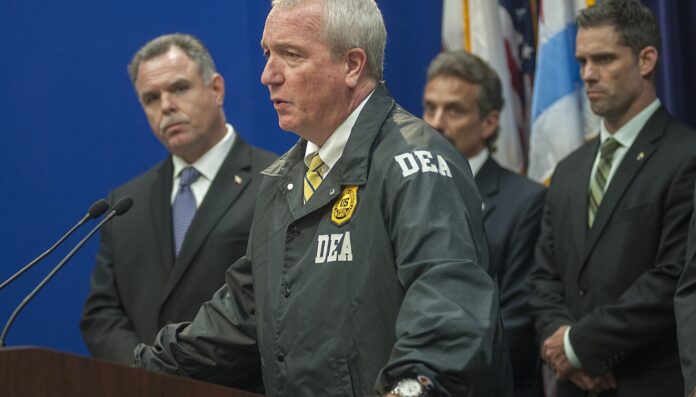Jack Riley, the fiery former head of the Drug Enforcement Administration’s office in Chicago, says he wants to come out of retirement to run the agency in Washington and “take another swing of the bat.”
In November, President-elect Donald Trump selected Chad Chronister, sheriff of Hillsborough County, Florida, as his choice to head the DEA.
But Chronister withdrew his name from consideration Dec. 3 without explanation. Conservatives were critical of Chronister for failing to engage in federal immigration enforcement activities.
Riley says he was encouraged to seek the DEA post during a conversation with a wealthy New York Trump donor who’s close to Howard Lutnick, Trump’s pick to be commerce secretary. Riley didn’t identify the donor.
Riley, the 66-year-old grandson of a Chicago cop, began his DEA career as an undercover agent in Chicago, busting mobsters and gang members involved in the drug trade.
During his storied career, he was chief of the DEA office in El Paso, Texas where, on the other side of the border, cartels were battling each other for control of the crossing in Ciudad Juarez, Mexico.
Much of the latter part of his career was devoted to the capture of Joaquín “El Chapo” Guzmán Loera, the Sinaloa cartel leader who was extradited from Mexico to the United States in 2017. Guzmán was sentenced to life in prison after a trial in New York in 2019 and sent to a maximum security prison in Colorado.
Riley ran the DEA’s Chicago office from 2010-2014 and was then promoted to chief of operations of the DEA in Washington before becoming deputy administrator, the No. 2 job, from which he retired in 2017.
In 2019, Riley published a book, “Drug Warrior: Inside the Hunt for El Chapo and the Rise of America’s Opioid Crisis,” detailing his DEA exploits.
The book rubbed some people in law enforcement the wrong way, including Robert Grant, former director of the FBI in Chicago, who wrote an op-ed in the Chicago Sun-Times saying, “Jack suffers from the current cultural problems of narcissism, wrapped in hubris and tied together with fiction, which is eroding our public discourse.”
In his op-ed, Grant countered Riley’s comments in the book that Grant “didn’t know the streets like I did” and that Grant was wrong during a meeting with former Attorney General Eric Holder to call for a reassessment on the “War on Drugs.”
In a Senate hearing in 2016, Riley warned of the rising opioid addiction crisis in the United States, pointing to the deaths of 47,000 people by overdose in 2014.
He said Mexican drug cartels posed the greatest criminal threat to the United States. But the problem has only gotten worse.
In 2023, overdose deaths surpassed 100,000 for the third straight year, a crisis driven by fentanyl. Experts say overdoses will decline this year, possibly as a result of a crackdown on fentanyl at the border.
Riley, in an interview with the Sun-Times, said the “War on Drugs” has morphed into the “War on Terror.”
“The War on Drugs predicts a beginning and an end, but there is no end. But it is also a national security issue,” he said.
Riley said his policies would dovetail with Trump’s pledge to clamp down on illegal immigration. “The open borders have really compounded the problems.”
Riley said part of his focus would be to identify and arrest undocumented immigrants serving as “proxies” in the United States for drug cartels in Mexico. He said DEA needs to expand its influence in Central and South America and “establish a more coherent relationship with our Mexican counterparts,” who he said are dealing with a fentanyl overdose crisis, too.
“And we are not doing anything on the northern border because we don’t have the bodies,” Riley said. “Hopefully, that will change.”
Since his retirement, Riley has been a regular face on network television news, including CNN and Fox News, as an expert on drug enforcement.

Former DEA deputy administrator Jack Riley on Fox News on Oct. 6, 2022.
The New York Times has reported that Chronister’s withdrawal from Trump’s nomination opened a possible path for other retired DEA veterans, including Derek Maltz, former head of the agency’s special operations division, and Ray Donovan, former chief of operations, who also played a central role in the capture of Guzmán.
